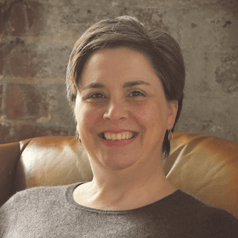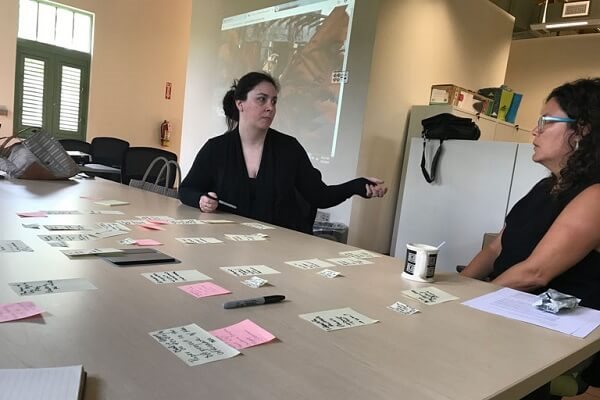Meet Jennifer Guiliano

Dr. Jennifer Guiliano is a white academic living and working on the lands of the Myaamia/Miami, Pokagon Band of Potawatomi, Wea, and Shawnee peoples. She currently holds a position as Professor (effective July 2023) in the Department of History and affiliated faculty in both Native American and Indigenous Studies and American Studies at Indiana University Indianapolis.
She received a Bachelors of Arts in English and History from Miami University (2000), a Masters of Arts in History from Miami University (2002), and a Masters of Arts (2004) in American History from the University of Illinois before completing her Ph.D. in History at the University of Illinois (2010).
She is the author of Indian Spectacle: College Mascots and the Anxiety of Modern America (Rutgers University Press, 2015), A Primer for Teaching Digital History: 10 Design Principles (Duke University Press, 2022), and is co-editor (with Roopika Risam) of Reviews in Digital Humanities, DevDH.org (with Simon Appleford), and Digital Humanities Workshops : Lessons Learned(with Laura Estill; 2023). She is also completing a co-authored work Getting Started in the Digital Humanities (Wiley & Sons).
She received the Digital Scholarship Visiting Research Fellowship at the University of Edinburgh in 2022, Fulbright Canada Research Chair in Digital Humanities at University of Guelph in 2020-2021, and has received more than $3.6 million dollars in funding for her research from the National Endowment for the Humanities, the Mellon Foundation, and others over the course of her career.

One of my favorite parts about my research is discussing how to write histories so that members of the public are interested in learning more.
Dr. Jennifer Guiliano

Q and A with Dr. Jennifer Guiliano
My mom was a family genealogist when I was growing up. I spent most school breaks in archives, libraries, and cemeteries helping her track down family records. That exercise translated into a keen interest in how historical records shape knowledge of the past. As I matured as a scholar, I became interested in non-written records (material culture, physical landscapes, oral histories, etc.) and how those records compare, contrast, and illuminate our knowledge.
Data culture is tied to the individuals, communities, institutions, and larger cultural milieu who are involved in its creation, documentation, analysis, and dissemination. Yet, so much knowledge from the 19th and 20th centuries is not held by Native communities and institutions but by non-Indigenous cultural heritage institutions. First and foremost, the question I ask is about identity politics: who has the right to speak for and about whom and what role should non-members play in articulating a community’s history, authority, or beliefs? Significantly, in colonial-centric collections, only legal access is required and/or commonly completed. Every community, every tribe, and even a single family might differ in their sense of what is appropriate for research or reuse and dissemination. When national borders divide those families, the question of research ethics becomes more complex.
While many people might think that Native cultural heritage is held geographically close to the Indigenous community it was extracted from, the reality is that materials are often held in cultural heritage institutions far away from those originating communities. You can find Indigenous holdings around the globe; often, those institutions have little if any contact with the Indigenous communities that those collections are about. Part of what my scholarship does is raise awareness about those holdings and the ethical and epistemological questions “owning” these collections introduce. The other part of my work is about working with cultural heritage institutions to develop narratives around their own local histories.
One of my favorite parts of my research is discussing how to write histories so that members of the public are interested in learning more. I love getting to help people incorporate new viewpoints or knowledge into the stories they tell.
Students in my "Introduction to Digital Humanities" course and my "Digital Public History" course spend time working with different types of cultural data; they research the records, write analysis, and contribute to public repositories of knowledge. They not only learn about local history and culture, but also about digital platforms and their use in publishing research.
I’m honored to have worked with community members throughout Indiana and the Midwest as they’ve developed their own digital cultural collections; they are incredible researchers and generously allow me to listen as they discuss their needs and approaches to complex historical records.
Right now, I’m writing up my research as a couple of peer-reviewed articles. One is an exploration of the practice of historians and how colonial records introduce very specific types of questions when using Indigenous records. The other is about how to work with under resourced cultural heritage organizations to incorporate emerging themes in historical research.
Conversation with Dr. Jennifer Guiliano
On Friday, November 17, 2023 from 12 noon to 1:00 p.m., Dr. Jennifer Guiliano talked about "Whose History Matters? Thinking about Collaboration and Open Access." While many people believe that Native cultural heritage is held geographically close to the Indigenous communities they were extracted from, the reality is that materials are often held in cultural heritage institutions far away from those originating communities. You can find Indigenous holdings around the globe; often, those institutions have little if any contact with the Indigenous communities that those collections are about. Part of Dr. Guiliano's scholarship includes raising awareness about these holdings and the ethical and epistemological questions “owning” these collections introduce. The other part of her research includes working with cultural heritage institutions to develop narratives around their own local histories. See examples of how local histories can inform contemporary practices around data, access, and collaboration.
Interested in Becoming an IUPUI TRIP Scholar?
Eligibility
IUPUI faculty member conducting translational community-based research
Benefits
- Valued member of an extensive network of researchers/collaborators
- Opportunities to showcase work
Subscribe to the TRIP Scholars of the Month

